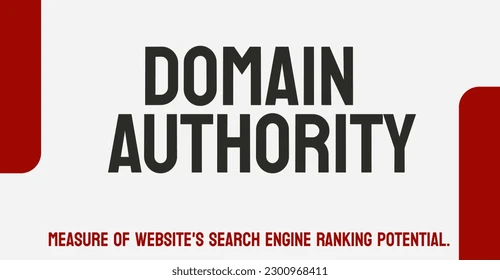Introduction:
In the world of, one of the most important metrics for evaluating a website : Domain Authority (DA). Developed by Moz, Domain Authority is a score ranging from 1 to 100 that predicts how well a website will rank on search engine result pages (SERPs). A higher DA generally indicates stronger ranking potential.
Marketers, bloggers, and businesses often use DA as a benchmark to compare websites, analyze competitors, and strategize link-building campaigns. Although DA is not a direct ranking factor used by Google, it strongly correlates with ranking performance.
In this article, we will cover what Domain Authority is, how it is calculated, why it matters, how to improve it, and answer the most common FAQs related to DA.
What is Domain Authority?
Domain Authority (DA) is a predictive SEO metric designed to estimate a website’s ability to rank in Google’s search results. It is not the same as Google’s PageRank but serves as a useful third-party measurement.
- Score range: 1 (weakest) to 100 (strongest).
- Based on: Moz’s algorithm considering multiple ranking signals.
- Purpose: To compare domains against each other and predict ranking potential.
For example:
- A new blog may have a DA of 5–15.
- A well-established website like Wikipedia or Amazon may have a DA of 90+.
Factors Influencing Domain Authority
Domain Authority is calculated by analyzing multiple signals, including:
- Link Profile (Backlinks)
- Number of backlinks pointing to the site.
- Quality of referring domains (high-authority vs. spammy).
- Diversity of link sources.
- Content Quality
- Relevance, originality, and depth of website content.
- Use of keywords, on-page SEO, and structured data.
- Website Age & Trustworthiness
- Older, well-maintained websites often have higher DA.
- Consistency of publishing quality content.
- Technical SEO
- Page speed, mobile-friendliness, site architecture, and security (HTTPS).
- User Engagement Signals
- Bounce rate, average session duration, and user interaction.
Domain Authority Calculation (Simplified Example)
Moz uses a machine learning algorithm with over 40 signals. While the exact formula is proprietary, we can understand the concept with a simplified calculation.
Suppose we assign weights to key factors:
- Backlink Quality & Quantity – 40%
- Content Quality & Relevance – 25%
- Technical SEO (Site Health, Speed, etc.) – 15%
- User Engagement (Bounce Rate, Time on Page, etc.) – 10%
- Domain Age & Trust Score – 10%
Example Calculation
Assume a website has the following scores (out of 100) for each factor:
- Backlinks = 70
- Content = 80
- Technical SEO = 60
- Engagement = 50
- Domain Age = 75
Now calculate DA: DA=(70×0.40)+(80×0.25)+(60×0.15)+(50×0.10)+(75×0.10)DA = (70 \times 0.40) + (80 \times 0.25) + (60 \times 0.15) + (50 \times 0.10) + (75 \times 0.10)DA=(70×0.40)+(80×0.25)+(60×0.15)+(50×0.10)+(75×0.10) DA=28+20+9+5+7.5=69.5DA = 28 + 20 + 9 + 5 + 7.5 = 69.5DA=28+20+9+5+7.5=69.5
Estimated DA = ~70
This is only a simplified model for understanding. Moz’s real algorithm is far more complex and relative, meaning DA scores are compared across all websites in their index.
Why is Domain Authority Important?
- Competitive Analysis – Helps compare your website with rivals.
- SEO Strategy – High DA sites attract more backlinks and organic traffic.
- Partnerships & Outreach – Bloggers and businesses use DA to evaluate link exchanges or guest posts.
- Monetization – Advertisers often consider DA when paying for sponsored content.
How to Improve Domain Authority
- Build High-Quality Backlinks
- Guest posting, digital PR, influencer outreach.
- Avoid spammy link schemes.
- Publish Valuable Content
- Long-form, keyword-optimized, and user-focused.
- Update old posts for freshness.
- Optimize Technical SEO
- Use HTTPS, improve mobile responsiveness, fix crawl errors.
- Increase site speed (Core Web Vitals).
- Enhance User Engagement
- Reduce bounce rate with interactive, engaging content.
- Improve site navigation.
- Be Patient
- DA growth is gradual. A new site won’t reach 70+ overnight.
FAQs?
1. What is a good Domain Authority score?
- 1–20: New or low-authority sites.
- 20–40: Decent authority, small blogs/businesses.
- 40–60: Strong websites, competitive in their niche.
- 60+: Highly authoritative, global-level sites.
2. Does Google use Domain Authority?
No. Google does not use DA directly in ranking. It is a third-party metric created by Moz, but it correlates with ranking factors Google values.
3. How long does it take to increase DA?
Usually 3–6 months with consistent efforts in link-building, SEO optimization, and content marketing.
4. Is Domain Authority better than Page Authority?
- Domain Authority predicts ranking potential of the entire domain.
- Page Authority (PA) predicts ranking strength of a single webpage. Both are useful depending on SEO goals.
5. Can DA decrease?
Yes. Reasons include:
- Loss of backlinks.
- Competitors improving faster.
- Algorithm updates by Moz.
6. How do I check my website’s DA?
You can use:
- Moz Link Explorer
- Ahrefs Domain Rating (DR)
- SEMrush Authority Score
Conclusion
Domain Authority (DA) is a powerful metric for predicting how well a website can perform in search engine rankings. While not a direct Google ranking factor, it is widely used for competitive analysis, SEO strategies, and digital marketing decisions.
